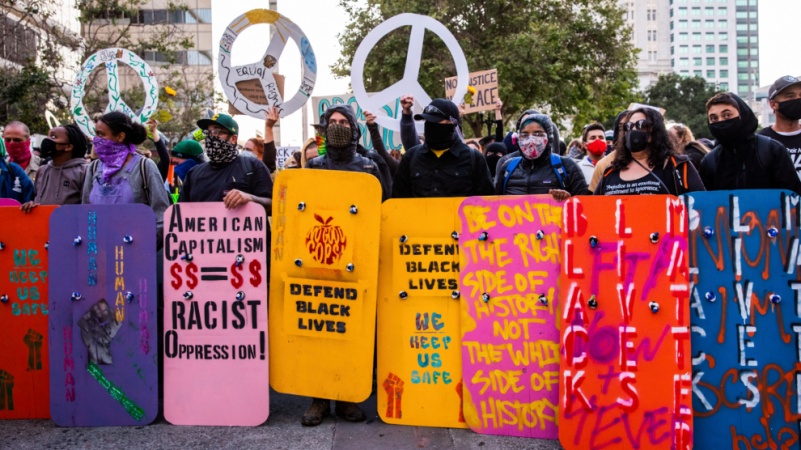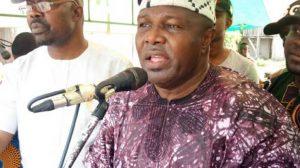
•Some demonstrators built makeshift barricades for protection during protests
Myanmar’s military rulers say they have fired the country’s ambassador to the United Nations after he called for help to remove the army from power.
In an emotional speech, Kyaw Moe Tun said no-one should co-operate with the military until it handed back power to the democratically elected government.
Security forces intensified a crackdown on anti-coup protesters on Saturday.
Local media say dozens were arrested, and that a woman was shot in the city of Monwya. Her condition is not clear.
The country has been rocked by protests since top government leaders, including Aung San Suu Kyi, were overthrown and detained after the army took power on 1 February.
What did the UN ambassador say?
Speaking at the UN General Assembly on Friday, Kyaw Moe Tun urged the international community to use “any means necessary to take action” against the military to help “restore the democracy”, saying he was representing Ms Suu Kyi’s ousted government.

“We need further strongest possible action from the international community to immediately end the military coup, to stop oppressing the innocent people, to return the state power to the people and to restore the democracy,” he said.
The speech was met with applause and Linda Thomas-Greenfield, the new US envoy to the body, was among those praising his remarks as “courageous”.
In a further show of defiance, Kyaw Moe Tun held up three fingers, a gesture against authoritarian rule that has been adopted by anti-coup protesters in the country.
Myanmar’s state television announced his removal on Saturday, saying he had “betrayed the country and spoken for an unofficial organization which doesn’t represent the country” and “abused the power and responsibilities” of an ambassador.
What happened in the country on Saturday?
Further protests were held in several cities with water cannon reportedly deployed and journalists among dozens detained.
In the main city of Yangon, crowds of protesters were advanced upon by police firing tear gas. Witnesses who spoke to the Reuters news agency said people were arrested and beaten by police, who also reportedly fired into the air, with similar clashes reported in the second city of Mandalay.
A number of local media outlets reported that a woman had been shot at a protest in the central city of Monwya, close to Mandalay. Images and an alleged identity circulated on social media but have not been independently confirmed.
An ambulance service official later told the Reuters news agency she was in hospital, contradicting other reports she had died.
A medic in the town told the AFP news agency he had also seen a man “severely injured” in his leg with at least 10 others treated for more minor injuries. Local media there also reported alleged beatings by plainclothes officers.
Protesters in some places, including Yangon, were seen building makeshift barricades to try and hinder the crackdown against them.
General Min Aung Hlaing has defended the coup he led, but at least three protesters and one policeman have died so far in violence against it.
According to the Assistance Association for Political Prisoners monitoring group, more than 770 people have been arrested and sentenced since the coup began.
At least three journalists were detained on Saturday including a photographer from the Associated Press, the AFP news agency reported.
What is the background to protests?
Military leaders justified the seizure of power by alleging widespread fraud in November elections, which Ms Suu Kyi’s National League for Democracy (NLD) won in a landslide.
She was placed under house arrest and charged with possessing illegal walkie-talkies and violating the country’s Natural Disaster Law. But there is growing uncertainty about her whereabouts amid reports on an independent news website on Friday that she had been moved to an undisclosed location.
A lawyer for the 75-year-old ousted leader told Reuters he had also heard she was moved and has been given no access to her ahead of her next hearing.
The army has ordered internet blackouts and also banned social media platforms but demonstrations have continued daily. The coup has been widely condemned outside Myanmar, prompting sanctions against the military and other punitive moves. (BBC)





















